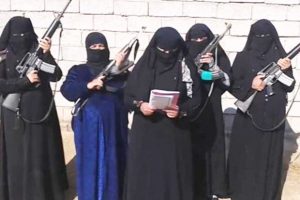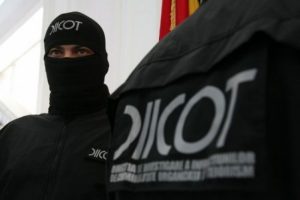Italy: Muslim Macedonian ‘terrorist’ nabbed, training for action
Italian security police on Tuesday arrested a 29-year-old Macedonian national, Agim Miftarov, on suspicion of terror offences. They said he had been training to carry out “imminent” terrorist action, like reported by ansa.it.
“The danger was imminent and concrete”, said a preliminary investigations judge.
A search of his home turned up drones, military clothing and a cellphone containing jihadi propaganda, and searches on self-training methods, as well as the use of armed commercial drones and the making of DIY taser guns.
Miftarov lived like “an ascetic” and had formed a terror of police, judicial sources said.
He worked as a lumberjack and lived in an apartment at Tolfa near Viterbo, they said.
Miftarov had no social life and was so afraid of police checks that he did not got to the ER when he hurt himself with an axe.
His computer showed more than 4,000 contacts with the jihadist world.
France to deploy undercover ‘marshalls’ on trains due to Islamic terror threat
Germany: Police arrest 10 Syrian refugees in anti semitic attack in Berlin park
Iran set up terrorist infrastructure in Europe
Iran has set up terrorist and intelligence infrastructure across Europe with aim of assassinating exiled Iranian dissidents and moderate Arab leaders, particularly those whose countries rival Iran in the Persian Gulf, intelligence experts told Israel Hayom.
According to both Israeli and foreign intelligence experts, the vast Iranian infrastructure was set up to serve the Revolutionary Guard Corps’ elite black-ops arm, the Quds Force.
One foreign intelligence official said that a prominent Arab leader had recently canceled a visit to Europe following solid information suggesting that an Iranian terrorist cell was planning to assassinate him.
Belgian authorities announced Monday that they have exposed extensive infrastructure deployed by the Quds Force and Iranian intelligence. Three people were arrested, including an Iranian diplomat, on suspicion of plotting to bomb a meeting of an exiled Iranian opposition group in France.
The IntelliTimes intelligence blog said Tuesday that former Prime Minister Ehud Barak was also in Paris during that time.
Shin Bet security agency Director Nadav Argaman met with Barak last week to discuss what was described as “urgent” concerns for his safety, over an alleged Iranian plot to attack Barak during one of his visits abroad.
The blog also reported that an Israeli diplomatic vehicle was recently stolen in one of Europe’s capitals, only to be abandoned in its Muslim quarter, suggesting that the thieves may have planned to use it to stage a terrorist attack against the Israeli mission in that city.
The blog further claimed that the Iranian terrorist infrastructure was headed by Asadullah Asadi, stationed as an attaché at the Iranian Embassy in Vienna. Belgium was selected to be the logistical base of operations for Iranian terrorist cells, which comprised Iranians who had migrated to Brussels, Antwerp and Mons.
Belgian intelligent officials said Asadi was arrested on German soil as he made his way from Vienna to Brussels as part of the final preparations for the attacks. Raids in the homes of the other suspects yielded various weapons.
U.S. mulls designating IRGC a terrorist group
CNN reported Tuesday that the Trump administration was weighing whether to designate the Islamic Revolutionary Guard Corps a terrorist group as part of its efforts to pressure Tehran.
The designation decision, formally under the State Department’s purview, is particularly important given the White House’s increasingly aggressive strategy toward Iran.
Officials have been debating it for several months and have yet to reach a consensus.
While some warn a designation could pose risks to U.S. personnel and overseas assets, it would allow the White House to freeze IRGC assets, impose travel bans and levy criminal penalties on top of pre-existing economic sanctions imposed by President Donald Trump.
U.S. Secretary of State Mike Pompeo is said to be in favor of the designation.
”There’s lots of things that are being discussed, things that will prove, we believe, very effective at the end goal-which is, at the end of the day, what matters, right?” Pompeo told CNN in a recent interview. “The end goal is to convince the Islamic Republic of Iran to be a normal country.”
Still, National Intelligence Director Dan Coats has cautioned the administration that designating a state’s military as a terror group, particularly one with the reach of the IRGC, would be unprecedented and could expose U.S. diplomatic and military officials to additional hazards.
Alireza Miryousefi, a spokesman for the Iranian Mission to the United Nations, told CNN that the possible terrorist designation was in keeping with an American tendency to use terrorism for political objectives.
“The U.S. has a long history of politicizing the term ‘terrorism’ for its own political ends, which undermines others fighting terrorism,” Miryousefi said. “To associate the term with the IRGC is categorically preposterous, especially considering their central role in fighting terrorism in the Middle East, including ISIS and al-Qaida.”
Also on Tuesday, Prime Minister Benjamin Netanyahu attended an event marking the United States’ Independence Day. The event was hosted by U.S. Ambassador to Israel David Friedman.
He criticized European leaders for meeting with Iranian President Hassan Rouhani while his country was plotting against the continent.
”President Trump decided to leave this bad deal and he did the greatest thing for the security of the world and for the security of Israel. Now, you should know that this is not yet universally accepted. And I can tell you that this week there’s going to be a meeting and the meeting is going to be in Europe.
“There is a meeting this week by the P4 [Germany, France, Britain and China] without the United States. They are going to discuss how to go around the decision that President Trump and the United Stated made to leave this bad deal, which is funding Iran’s terrorism and its aggression with billions of dollars,” he said.
”There is in the same week something extraordinary. The P4 invited Iran’s President Rouhani to attend that meeting. But at the same time, in recent days, this same regime dispatched a terrorist cell to carry out a major terrorist attack in France.
”The commander of this terrorist cell was an Iranian diplomat in Austria. Fortunately, the plot was exposed. The cell’s Iranian members were arrested in France, Belgium and Germany. France and Germany are part of the P4. At the time of their capture, the cell members had explosives, detonators and more. European authorities are now completing their investigation and are expected to charge the Iranian agents and cell members behind the plot.
”This Iranian terror plot was planned on the soil of Europe on the same week that the European leaders are supposed to meet the President of Iran about circumventing the sanctions on Iran. Here’s my message to the European leaders: Stop funding the very regime that is sponsoring terrorism against you and against so many others. Stop appeasing Iran,” Netanyahu said.
Two muslim Bosnians charged with plotting Islamist attack on state police
Bosnia’s state prosecutor on Tuesday charged two radical Islamists with plotting a terrorist attack on security police, like reported by reuters.com.
The Sarajevo prosecutor’s office said Maksim Bozic, an Orthodox Serb convert to Islam known as “Muhamed”, and Edin Hastor, a Bosniak Muslim, were members of the ultra-conservative Salafi movement and accused them of cooperating with unnamed persons in obtaining weapons and explosive devices.
It said Bozic, 28, and Hastor, 46, were suspected of plotting an attack on the headquarters of the State Protection and Investigation Agency (SIPA) and interior ministry of the northern canton of Tuzla.
The attack could have “seriously destabilised the political and constitutional order as well as security in Bosnia and the region,” a statement by the prosecutor’s office said.
The two men were arrested in a police operation in April during which grenades, automatic weapons, combat vests and other military equipment were seized, it said.
Bosnia’s Muslims are generally moderate but some have adopted radical Salafi Islam under the influence of foreign fighters who came to the country during its 1992-95 war to fight alongside Muslims against Orthodox Serbs and Catholic Croats.
Some of them have formed groups which Bosnia’s moderate national Islamic organization is seeking to dismantle.
Iranian diplomat detained in Germany for preparation of terror act in France
An Iranian diplomat has been detained in Germany for preparation of a terror act in France.
“One of those who contacted the detainees is A. Assadolah born on December 22 1971, he is a citizen of Iran. He was detained in Germany. He is an Iranian diplomat in the embassy in Vienna,” said the prosecutor’s office of Belgium which prevented the attack.
The prosecutor’s office said several other people have been detained in France.
“Presumably the attack was prepared by two natives of Iran. They planned a terror act in the time of meeting of the expelled Iranian opposition party. Police found a hand made bomb in the car,” reads the message.
Germany arrest Islamic State morality police female in Iraq
German authorities say they have arrested a 27-year-old German woman suspected of being part of the so-called Islamic State group’s “morality police” in Iraq, like reported by abna24.com.
Federal prosecutors said Monday that Jennifer W. traveled to Iraq via Turkey and Syria in September 2014, where she joined the extremist group.
In a statement, prosecutors said she patrolled parks in Fallujah and Mosul, ensuring that women adhered to the dress and behavior codes imposed by IS.
W., whose surname wasn’t released for privacy reasons, was arrested by Turkish police in January 2016 after applying for a passport at the German embassy in Ankara. She was deported to Germany days later.
Prosecutors said she was arrested in southern Germany on Friday and her home in northern Germany searched. She’s accused of membership in a foreign terrorist organization.
How will Europe deal with 1,500 returning Islamic State group fighters?
It is not known how many of those remaining are still alive, or in detention, but observers say there are several hundred detainees in Iraq and Syrian Kurdish regions.
Europol’s recent Terrorism Situation and Trend Report [TE-SAT] warns that a particularly strong security threat is posed by individuals who have received prolonged ideological indoctrination, military training in the use of weapons and explosives, or have gained combat experience during their stay in a conflict region.
They may also have established links to other FTFs abroad and become part of capable transnational networks.
These returning fighters will have increased proficiency in terms of carrying out attacks, will be more brutalised and prone to violence, will have developed a high degree of security awareness, and some will perpetuate the terrorist threat to the EU through radicalising, fundraising and facilitation activities.
While the first groups of returnees were often disappointed with their situation in the ‘caliphate’ and decided to return home, Europol adds, the returnees of already defeated IS will have other motivations.
According to TE-SAT the subsequent activities of the returnees have been diverse.
They range from reduced involvement in the extremist milieu (even to the point where such activities no longer exist), to persons prone to violence.
However, some countries suggested that a disposition to extremist ideology is likely to prevail, which allows the returnee’s mobilisation at short notice. And in the light of the horrible terrorist attacks Europe faced in recent years, it is no wonder that governments are extremely reserved about bringing FTF’s back home.
None of EU member states has actively engaged in the process of bringing back citizens detained abroad. Moreover, there have been numerous statements of official figures that contradict everything Europe nominally stands for as far as human rights are concerned, but nevertheless probably reflect the general feeling among EU’s population.
French Defence Minister Florence Parly said loud and clear that “if the jihadists perish in this fight, I would say that’s for the best.”
UK’s junior foreign minister Rory Stewart was on the same lines, telling BBC that there was only one way to neutralise British IS fighters.
“Unfortunately, the only way of dealing with them will be, in almost every case, to kill them.”
State groups in Syria reportedly have tacit instructions on dealing with the foreigners who joined the extremist group – Kill them on the battlefield and the message for months has been ‘Ideally, no prisoners’.
French media even reported on the deployment of French Special Forces with orders to eliminate French IS fighters before they were captured or able to return home.
In fact, UK and France have no intention to take their citizens back, while the position of Germany remains unclear.
The British are simply revoking FTF’s citizenships wherever legally possible. It seems that for European leaders the most welcome solution would be to hand over responsibility for prosecuting the extremists and their followers to the Iraqi, Syrian or Kurdish judicial system.
However, in most cases of active fighters that would mean a death penalty, which EU has been very vocal against everywhere else in the world.
On the other hand, there is a legitimate concern that in many cases, there would be inadequate evidence to secure a conviction in Europe.
But many captured extremists could walk free anyway, since the Syrian Kurds are struggling to keep their IS prisoners under guard and could also use them as leverage for their political goals. So, there is always a possibility that the prisoners will be released at some point.
But it is not just adult men in the detention camps, there are also women and children who followed their husbands and fathers or were born during the caliphate. And while EU countries say they will bring back children up to the age of 10, the public pleads to let the families come back that some of FTF’s wives have made, have gone unanswered.
In Germany at least, even children are being regarded as a security threat.
“We consider the return to Germany of jihadists’ children, indoctrinated in a warzone, to be dangerous,” German intelligence chief Hans-Georg Massen warned. “This could allow a new generation of jihadists to be raised here.”
Different approaches to deradicalisation and reintegration
For those who did make it back to Europe, numerous reform programs have been developed. Often, they aim to do more than challenge ideological interpretations by helping in other areas such as schooling, employment, housing, social relations, and psychological welfare.
Dutch initiative called EXIT, for example, focuses on returnees that decide to participate on a voluntary basis, whereas the Danish Aarhus programme focuses solely on returning FTFs who are not being prosecuted for criminal charges.
The latter connects police, state welfare services, and community organisations in providing a range of services to individuals returning from Syria.
Similar initiatives are being introduced in Germany, the Netherlands, the United Kingdom, and other European countries.
A recent study by the Brussels-based Egmont Institute has assessed the still evolving policies in the Netherlands, Germany and Belgium. Early on, returnees were not systematically prosecuted, let alone convicted, primarily because the criminal code simply did not cover this kind of circumstances. Women were as a general rule not prosecuted.
Since then legislation changes have been adopted throughout Europe and now returnees are arrested and put on trial, with no distinction made between men and women.
Once a returnee is in prison, Belgium prefers a regime of dispersal among the general prison population, while the Netherlands places both, suspects of terrorism-related crimes, as well as convicted terrorists, in a high-security detention centre.
All three countries developed personalised approach that aims to change individuals’ views of violent actions rather than changing their thinking and ideology per se.
Upon release, the three countries have different approaches to reintegration. In the Netherlands, tailor-made accompaniment is available for former convicts to help them get on with their lives. Decisions are made by local authorities and the Dutch Probation Service.
Germany has been implementing a project known as HAYAT since 2012, trying to rehabilitate and reintegrate returned foreign fighters into the German society whenever possible.
The methodology is threefold – it aims to encourage the foreign fighters to abandon the extremist ideology and to refuse violence; to assist returned foreign terrorist fighters in finding employment, and to restore emotional empathy between the returned fighter and their family of origin.
Michiel Schoenmakers, a spokesperson for Dutch Ministry of Justice and Security, told The New Arab that scarcely any returnees have succeeded in leaving the conflict zone in Syria and Iraq and reaching the Netherlands.
As of March 1, 2018, around 300 Dutch people have travelled to Syria and Iraq, approximately 75 of whom have been killed. Of the rest, around 50 extremists have returned to the Netherlands.
Returnees are detected as early as possible, Schoenmakers says, to minimise their potential threat. Every returnee is arrested for questioning and is prosecuted based on the criminal investigation.
France, on the other hand, has been completely unsuccessful in its reforming efforts. Only one of the planned 12 deradicalisation centres has been opened after years of delays, and even that one sits empty.
The idea behind Centres for Prevention, Integration and Citizenship as they are officially called, was to impose rigorous routines on those they housed, as well as to subject them to intense courses in French history and philosophy.
Furthermore, an assessment is made of the threat that is posed by each returnee. Returnees are also subject of discussion between all relevant parties on a local level in their municipality of origin. Here it is decided whether any interventions are needed, and which interventions are best suited to minimise the potential threat from a returnee.
As far as children are concerned, all three countries start from the same premise, that children are victims and not criminals.
However, since six-year-olds will have been exposed to extremist indoctrination and nine-years-old will have received military training, a security component is often a part of the programme, especially in the case of teenagers and tailor-made accompaniment is standard practice.
The Belgian government has been explicit that children under 10 years old should be repatriated, if possible, and put under childcare provisions, while children above 10 will be treated on a case-by-case basis.
Germany has no official policy yet, but seems to be leaning in the same direction, whereas the topic is only now emerging in the Netherlands, Egmont’s paper noted.
Only time will tell, how successful the reintegration programmes have been or indeed can be.
For as long as push factors, such as isolation, marginalisation, polarisation, and the stigmatisation of Islam, stay in place, the genesis of new embryo of radicalisation, whether it be al-Qaeda, IS or something new, is almost guaranteed.
Romania: 15-years old held for Islamic terrorism
Romania’s anti-organized crime directorate DIICOT held a 15-years old young man for promoting Islamist ideologies and for contacting terrorist organizations offering to convince and draw new followers, like reported by romania-insider.com. He also developed plans to attack important objectives and civilians, according to the prosecutors.
The young man, who is living in Bucharest, also trained himself on producing improvised explosive devices, according to the DIICOT press release.
Last year, a 17-year old Romanian man from Craiova was convicted to three years and four months in jail for jihadist propaganda. He had also trained for a terrorist attack and actively promoted the radical Islamic doctrine.
- « Previous Page
- 1
- …
- 28
- 29
- 30
- 31
- 32
- …
- 200
- Next Page »












